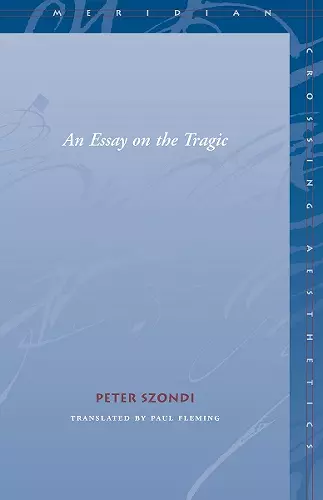An Essay on the Tragic
Peter Szondi author Paul Fleming translator
Format:Hardback
Publisher:Stanford University Press
Published:23rd Jul '02
Currently unavailable, and unfortunately no date known when it will be back
This hardback is available in another edition too:
- Paperback£18.99(9780804743952)

Peter Szondis pathbreaking work is a succinct and elegant argument for distinguishing between a philosophy of the tragic and the poetics of tragedy espoused by Aristotle. The first of the books two parts consists of a series of commentaries on philosophical and aesthetic texts from twelve thinkers and poets between 1795 and 1915: Schelling, Hölderlin, Hegel, Solger, Goethe, Schopenhauer, Vischer, Kierkegaard, Hebbel, Nietzsche, Simmel, and Scheler. The various definitions of tragedy are read not so much in terms of their specific philosophies, but rather in the way their views assist in analyzing tragedies with an aim to establish a general concept of the tragic.
The second part presents exemplary analyses of eight tragedies: Sophocles'Oedipus Rex, Calderons Life Is a Dream, Shakespeares Othello, Gryphius Leo Armenius, Racines Phaedra, Schillers Demetrius, Kleist's The Schroffenstein Family and Büchner's Danton's Death. The readings neither presuppose a concept of the tragic determined by context (as in Hegel's idea of the conflict between two orders of right), nor do they focus exclusively on the texts explicit contents. Instead, they elaborate the dialectical or aporetic structures at the heart of the tragic. The works analyzed represent the four great epochs of tragic poetry: the age of Greek tragedy; the Baroque era in Spain, England, and Germany; French Classicism; and the age of Goethe.
“This is a gem of a book. Few critics would be capable of engaging a significant number of the great tragedies and important theorists of tragedy in such short compass. But Szondi does it in completely remarkable fashion. Not only does this make for captivating reading, it also makes this a virtually ideal teaching tool, for it features the signature of Szondi’s writing: great clarity, about complex matters. No one has really replaced Szondi in his role as a theoretically informal interpreter of comparative literature.”—Ian Balfour, York University
ISBN: 9780804742375
Dimensions: unknown
Weight: 277g
128 pages